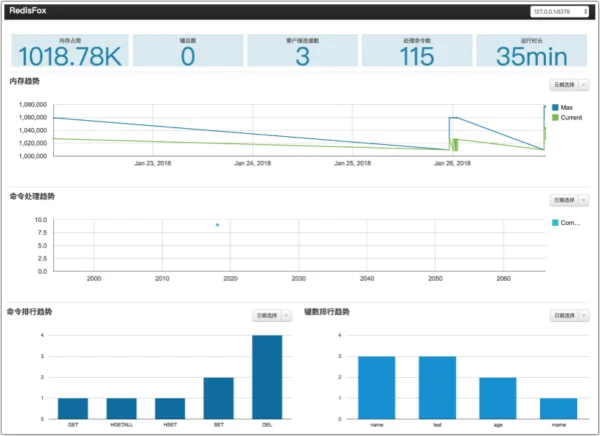Introduction
RedisFox is a visual monitoring tool for Redis based on Golang development

Instructions
Special description
- Go version requires >1.12, and use go modlue as package dependency management(The author used Go1.12.9)
- Run with gosuv driver, currently gosuv only supports Linux
- Download RedisFox
git clone https://github.com/zer0131/RedisFox.git
- Compile and Install
sh build.sh
- Run
Adjustment programs.yml directory Configure the redis server in conf/redis-fox.yaml, open redis, and then execute the run.sh script
cd output sh run.sh start
- Visit
Open the browser to access and see the monitoring status of redis态
- Stop
sh run.sh stop
Directory Structure
├─config Config directory │ ├─redis-fox.yaml Config file ├─log Log directory ├─data Data directory ├─static Resource directory ├─tpl Template directory ├─tool Tool directory ├─conf Source Code conf ├─dataprovider Source Code dataprovider ├─process Source Code process ├─server Source Code server ├─util Source Code util ├─main.go Source Code main file └─build.sh Compile and install the script
Configuration Description
Configuration based on yaml syntax, do not understand the stamp herehttp://www.ruanyifeng.com/blog/2016/07/yaml.html
#!The same level of field indentation is the same, and can only be indented with space. #!The relative "-" or ":" must have spaces before each field value value #[Redis service configuration] #redis server servers: - server: 127.0.0.1 port: 6379 conntype: tcp password: 123456 #passport #Get redis information interval time (second) sleeptime: 30 #The maximum number of connections in the redis connection pool maxidle: 3 #The maximum number of active redis connection pools, 0 unrestricted maxactive: 3 #The redis connection pool connects the timeout time, and 0 indicates no timeout idletimeout: 0 #Storage data type datatype: sqlite #Data storage path datapath: ./data/redisfox.db #Log logpath: ./log/ logname: redisfox.log loglevel: 4 #Web serverip: 127.0.0.1 serverport: 8080 debugmode: 0 #Resource staticdir: ./static/ tpldir: ./tpl/
Nginx
server {
server_name wwww.xxxx.com;
listen 80; # or 443
# ssl on; Whether to enable encrypted connections
# If you use HTTPS, you also need to fill in ssl_certificate and ssl_certificate_key
location / { # If you want to access the subpath, this is changed to a subpath, pay attention to / begin and end / end
proxy_pass http://127.0.0.1:8080/;
}
access_log /your-path/nginx/logs/redisfox.log;
}
